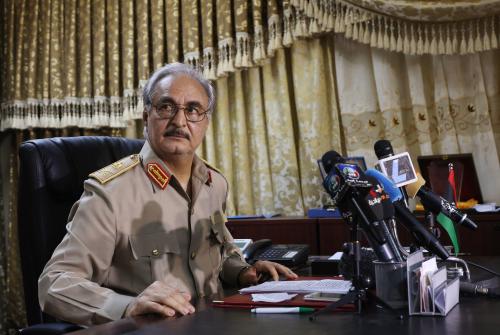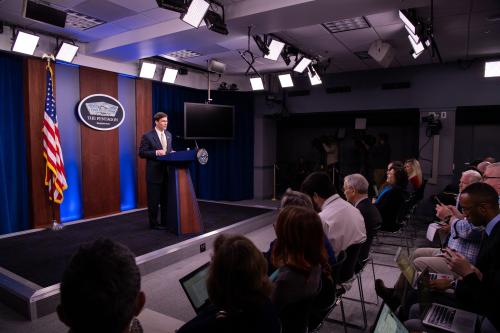The United States has a security assistance policy and a human rights policy—but how do they intersect? Considering that the United States spends $25 billion a year both training and equipping foreign security forces, aligning these goals is critical to ensuring that U.S. national interests in promoting stability and peace around the world are properly served.
To mark International Human Rights Day, the Project on International Order and Strategy hosted Assistant Secretary of State for the Bureau of Democracy, Human Rights and Labor (DRL) Tom Malinowski for a discussion on how the U.S. government is working to promote respect for human rights among countries that receive U.S. security assistance. Following his remarks, Brookings Senior Fellows Ted Piccone and Daniel Byman joined Malinowski for a discussion on this issue.
Malinowski acknowledged that training security forces inevitably means contributing to a mission to kill people. But while training foreign security forces in the use of deadly force is necessary to protect innocent lives, he noted that “we have learned the hard way that very few of the threats that we have to use force against can be eliminated by force alone”:
Addressing underlying causes of insurgencies: The United States is working with partners in Kenya and Somalia to understand how and why young men are being recruited to join radically violent groups like al-Shabaab. Malinowski also pointed to the good work that civil society and religious groups are doing on the ground to address this challenge. Efforts to encourage desertion from insurgency forces, however, are often impeded by the real threat of human rights violations perpetrated by state security forces against former insurgents.
Human rights abuses by security forces: The Obama administration has taken multiple steps—including taking executive action—to do everything possible to avoid causing civilian casualties in our own operations, and take responsibility if we do cause them. Malinowski pointed out that government security forces need to be seen by the population as protectors if they are to unite against an insurgency. In the case of Boko Haram in Nigeria, the United States is working with the Nigerian military to build public trust that it will avoid human rights abuses, and be held accountable if abuses happen. In Colombia, he noted that “the government’s increasing success in the fight against the FARC coincided with greater attention to accountability and human rights.”
Leahy Law: Malinowski raised the Leahy Law, which prohibits the U.S. Departments of State and Defense from providing security assistance to foreign security units that violate human rights with impunity. He called it “a scalpel,” noting that decisions to give or withhold U.S. support are made on a unit-by-unit basis, rather than for a country’s entire security force. He also said that DRL has doubled down on “Leahy outreach” and “Leahy diplomacy,” focusing on explaining what the law is used for and how the United States can help partner countries reach compliance:
Following Malinowski’s remarks, Dan Byman responded that although he thinks efforts to integrate human rights into security training is vital, there are too few programs with too little funding for these efforts to be truly effective. He pointed out that closing the spaces available for militant groups to organize, arm, and train, would be more effective, although very difficult:
Malinowski pointed to Burma, a case where the United States promoted both human rights and democratic principles like civilian control of the military. Washington has required all military assistance to be requested by civilian authorities, for example, forcing the Burmese military to recognize civilian authority. He conceded that:
“You will probably offer up a number of examples of countries where our policy is a bit more muddled, and that’s true, because the one thing we will never be in American foreign policy is consistent, and I’ve always preferred inconsistency to the only form of perfect consistency that is possible in this world, and that is to consistently be unprincipled.”
Turning to President Obama’s recent executive action on this issue, Malinowski argued its benefits are two-fold:
- It compiles Washington-guided, military-developed rules and procedures (which had previously been very ad-hoc) for security forces to engage with and earning the trust of civilian populations when they are fighting an insurgency.
- It requires U.S. security forces to incorporate these rules and procedures in its engagements with foreign security partners.
Dan Byman added his disappointment in the late timing of the executive action, which he believes reduces the likelihood that it will be accepted by the new administration. If the Obama administration had issued the order two years ago, and then ensured that its own policies were held to that standard, it would be much more difficult for the new administration to disregard.
Ted Piccone closed the discussion with a key takeaway that respect for human rights among security forces is a realist, rather than idealist principle, arguing that “these fundamental principles are not just American values, but are actually key instruments for getting better security outcomes.”




Commentary
WATCH: Experts discuss U.S. security assistance and human rights
December 19, 2016